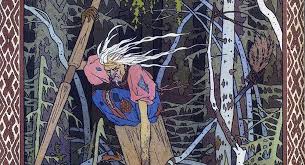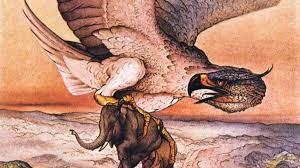Mythical Monsters: The Näcken
Poor old fellow, why do you play? Will it take the pain away?
Where by the marishes boometh the bittern,
Näcken the soulless one sits with his ghittern.
Sits inconsolable, friendless and foeless.
Waiting his destiny– Näcken the soulless
— Sebastian Evans, 19th century poet
In the frigid waters of Scandinavia, the lonely Näcken cradles his fiddle, serenading the stars with the song of his anguish. Forbidden to leave the river’s grasp, he can only materialize beneath the spray of a waterfall, though he rarely chooses to do so anymore. The soft rustle of the trees, the bright gaze of the moon, the distant echo of a kulning call— they are all bitter reminders of a life he will never have, such simple pleasures denied to him forever. Claimed by none and spurned by all, the wretched Näcken shies away from any and all contact with other beings, scared of being flayed alive by their harsh words once again. He is depravedly and utterly alone, and though his heart cries out for companionship, at least he is safe from iron-barbed betrayal.
It was not always this way. Once, the Näcken delighted in what little contact he had with the outside world, inviting people from far and wide to come and hear him play. His music was legendary, unlike anything human hands could produce; the rushing river would stand still to listen, the very trees uprooting themselves to dance along. When the Näcken gave a performance, it was common to see all manner of folk crowding the riverbank. If tears were shed over the slower songs, they would not be counted against manhood; after all, who could resist the Näcken’s charms? It was a joyous display of rare friendship between the natural and supernatural– but of course, it couldn’t last.
The Näcken’s last performance began innocuously enough: what was once a hard trek to reach his river dwelling had become a well-travelled road as his fame grew, and with the newfound ease of travel, more and more prospective audience members were willing to make the trip. One among them was the pregnant Eilde, who eased herself down onto a fallen log to listen to the Näcken’s clever music. The performance went horribly, heartbreakingly awry. The Näcken’s playing was such that it attracted all ears as bees to honey; as soon as the first note was struck, Eilde’s unborn babe couldn’t resist a desperate attempt to emerge from its mother so as better to hear the Otherworldly fiddler. Eilde let out a terrible cry, but it was too late to prevent the miscarriage. Everything erupted into chaos: the children were hurried away, men raced to the nearest village for help, and the women comforted Eilde, doing what little they could to save her. Stranded in the water, the devastated Näcken was all but forgotten in the pandemonium; powerless to help, he stood with his hand outstretched hopelessly as Eilde was quickly borne away on a makeshift litter.
After that, there were no more performances. The Näcken, cried the townfolk—Eilde loudest of all—played a cursed tune, seeking to beguile and slay his victims. At first, many were hesitant to believe the rumors, but the heinous evidence could not be refuted. The humans’ unease thickened like gruel, congealing into cold hatred.
For decades, the Näcken eschewed almost all human contact, fading from first-hand accounts to the annals of wetnurse’s tales. Just as abruptly, however, he reappeared—purportedly startling a father and son fishing from their faering. He frantically insisted that they would drown if they remained on the water, but they refused to listen, cursing him as a child-murderer and devilspawn. Still he followed their boat, futilely begging for them to have the wisdom to save themselves. He vanished only when the father threw a rod of iron overboard, the age-old method of banishing water-sprites.
That evening, a horrible storm swept in, harsh blasts of wind stirring the waters to a boiling froth. The tiny fishing boat was dashed against the rocks, splintering like firewood—and with it, the father’s head. The son was found beneath the waterfall three days later, sodden with both water and blood. During brief periods of consciousness, he told a harrowing tale of the water-demon Näcken threatening to drown him and his father before the storm struck; he claimed that the fell creature was dragging him back to his lair to devour him. The Näcken, of course, was doing nothing of the sort; he had been trying to save the boy’s life. But humans will always make monsters to absolve themselves of guilt and shame, so his desperate lie struck home and held fast like an arrow, crippling the Näcken with its poison. Three more times did the poor and lonely soul appear to warn sailors of impending doom; thrice was he rebuffed with venomous words and searing iron, and thrice were bodies found ashore the following day. Finally forced to confront the futility of repairing his relationship with humankind, the Näcken disappeared for good, surfacing only in the dead of night to cry his grief to the unfeeling heavens.
…Or not. Some say that, spurned and abused for so long, the Näcken’s selfless heart grew dark and twisted—as did the songs he once loved to play. Fulfilling the prophecy that the malicious townsfolk unwittingly made, the Näcken seeks his revenge by luring men to drown with his cursed music. Still others claim that the confirmed deaths are entirely accidental; as the Näcken’s fiddle gives voice to his heartbreak, any unfortunate listeners are struck with the dire urge to kill themselves rather that experience the sheer agony in his emotional music. Both interpretations have spawned much debate even in modern times, and the Näcken remains a tragic—or terrifying— yet popular figure in Scandinavian folklore. Should you wish to delve further into the mysteries and myths of the north, Unforgiving: A Northern Hymn is a beautifully-crafted horror game that brings you face-to-face with the Näcken himself. Whether he’s misunderstood or murderous, you be the judge…








